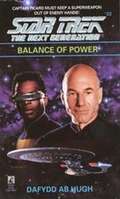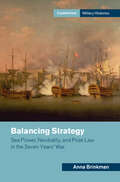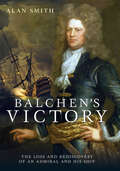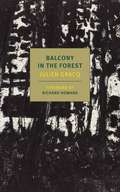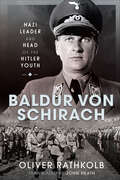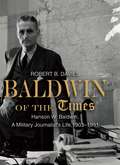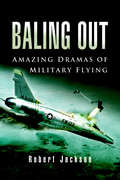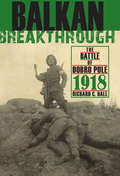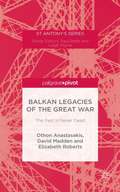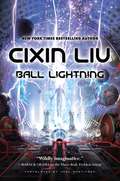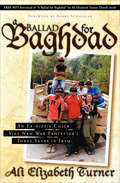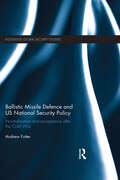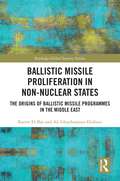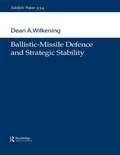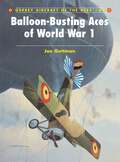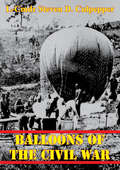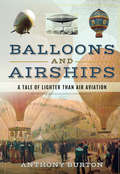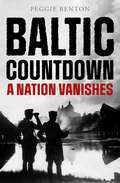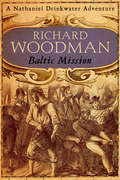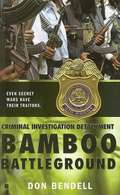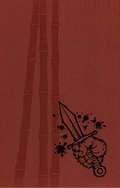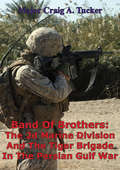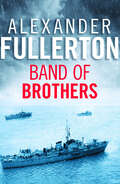- Table View
- List View
Balance of Power (Star Trek: The Next Generation #33)
by Dafydd ab HughWhen a famous Federation scientist dies, his son puts his inventions up for sale to the highest bidder, be they Federation, Klingon, Romulan, or Cardassian. Among the items at auction is a photon pulse canon capable of punching through a starship's shields with a single shot. Meanwhile, Wesley Crusher is kidnapped from the Academy by renegade Ferengi who have set their sights on the photon canon as well, and Captain Picard must outmaneuver enemies on every side to save Wesley and protect the EnterpriseTM from the deadly fire of the new canon.
Balancing Strategy: Sea Power, Neutrality, and Prize Law in the Seven Years' War (Cambridge Military Histories)
by Anna BrinkmanWhat is the relationship between seapower, law, and strategy? Anna Brinkman uses in-depth analysis of cases brought before the Court of Prize Appeal during the Seven Years' War to explore how Britain worked to shape maritime international law to its strategic advantage. Within the court, government officials and naval and legal minds came together to shape legal decisions from the perspectives of both legal philosophy and maritime strategic aims. As a result, neutrality and the negotiation of rights became critical to maritime warfare. Balancing Strategy unpicks a complex web of competing priorities: deals struck with the Dutch Republic and Spain; imperial rivalry; mercantilism; colonial trade; and the relationships between metropoles and colonies, trade, and the navy. Ultimately, influencing and shaping international law of the sea allows a nation to create the norms and rules that constrain or enable the use of seapower during war.
Balchen's Victory: The Loss and Rediscovery of an Admiral and His Ship
by Alan SmithThis is the story of Admiral Sir John Balchen, his life and career, and HMS Victory, the largest, finest ship-of-the-line in the Royal Navy at the time, which he commanded when both were lost, along with more than 1,000 crew, in an October storm in the English Channel in 1744. This is not the Victory of Trafalgar fame, however, but the First Rate built some thirty years earlier, the last Royal Navy three-decker to carry bronze cannons, and a ship whose poor design may well have contributed to her loss. It is also the story of Admiral John Balchen, a courageous, if not heroic, naval officer who saw major engagements and whose legacy in naval development deserves greater recognition. Indeed, the story of both the ship and her commander, their individual and remarkably parallel lives, can now be revealed as fundamental catalysts to the revolutionary reforms in naval shipbuilding, design and dockyard administration that transformed the Royal Navy after 1745. They were indeed major foundation stones for a navy that delivered the glorious achievements of Nelson, Anson, Howe, Hood, Rodney, Boscawen and many more in the great pantheon of British naval history that followed their loss. The exciting discovery of the wreck of HMS Victory in 2008, the subsequent and continuing public and political wrangling over possible salvage, and the 2019 display at Portsmouth of a mighty 42-pounder bronze gun retrieved from the wreck, have been the catalyst for this history of the admiral and his ship, and anyone with an interest in naval or maritime history, whether academic or popular, will be fascinated by the facts about the hitherto virtually unknown predecessor of Nelson’s great flagship. This glorious man-and-ship odyssey, whose intrinsic importance to naval history can now be recognised, is richly and compelling told in this important new book.
Balcony in the Forest
by Richard Howard Julien GracqIt is the fall of 1939, and Lieutenant Grange and his men are living in a chalet above a concrete bunker deep in the Ardennes forest, charged with defending the French-Belgian border against the Germans in a war that seems unreal, distant, and unlikely. Far more immediate is the earthy life of the forest itself and the deep sensations of childhood it recalls from Grange’s memory. Ostensibly readying for war, Grange instead spends his time observing the change in seasons, falling in love with a young free-spirited widow, and contemplating the absurd stasis of his present condition. This novel of long takes, dream states, and little dramatic action culminates abruptly in battle, an event that is as much the real incursion of the German army into France as it is the sudden intrusion of death into the suspended disbelief of life. Richard Howard’s skilled translation captures the fairy-tale otherworldliness and existential dread of this unusual, elusive novel (first published in 1958) by the supreme prose stylist Julien Gracq.
Baldur von Schirach: Nazi Leader and Head of the Hitler Youth
by Oliver RathkolbThough three of his four grandparents were from America and the first language he learned at home was English, Baldur von Schirach became one of the Third Reich’s most influential individuals. He joined the Nazi Party as early as 1925 at the age of eighteen and three years later became a member of its National Leadership. He also married Henriette, the daughter of Hitler’s personal photographer, Heinrich Hoffmann. Von Schirach continued to rise through the ranks of the Nazi Party, reaching the rank of SA-Gruppenführer. It was as the leader of the Hitler Youth organization, however, for which von Schirach is best remembered, becoming Reichsführer of the Hitler Youth on 16 June 1932, and the following year was given responsibility for all youth organizations in Germany. He also became a member of the Reichstag as a representative of the Party. Despite his influential position, he was called up for military service and served in the French campaign of 1940. Following this he became Reich Governor and the Nazi’s Gauleiter Reichsstatthalter in Vienna – powerful positions he retained until the final collapse of the Third Reich in May 1945. His responsibilities as Gauleiter and Reichsstatthalter included overseeing the deportation of Vienna’s Jews to ghettos and concentration camps in occupied Poland. Though a confirmed anti-Semite, later in the war he pleaded for a moderate treatment of the eastern European peoples and criticized the conditions in which Jews were being deported. This caused a breach with Hitler and the Nazi leadership, though he managed to retain his position in Vienna. Following his capture by US troops, von Schirach was among the major war criminals put on trial at Nuremburg. Found guilty of crimes against humanity on 1 October 1946, von Schirach was sentenced to twenty years imprisonment. He served out his time in the company of Rudolf Hess and Albert Speer in Spandau prison. He admitted his crimes and his role in the deportations and in his autobiography, I Believed in Hitler, he explained how he was drawn into the world of the Nazis. He also said that his aim was destroy any belief in the rebirth of Nazism as well as blaming himself for not having done more to prevent the concentration camps. This detailed and balanced analysis of Baldur von Schirach reveals the true and ambivalent nature of a complex and fascinating individual who played a key role in the events leading up to, and during, the Second World War.
Baldwin of the Times
by Robert DaviesHanson W. Baldwin was America's best-known military writer and analyst in the 20th Century covering conflicts from World War II to the Vietnam War. He was the military editor of the New York Times for forty years and his dispatches from Guadalcanal and the Western Pacific won him a Pulitzer Prize in 1943.This first biography of this Naval Academy graduate begins with an appreciation of the human and literary values learned from his Baltimore newspaper family. His midshipman years, 1920-1924, taught him the value of concentration. After three years of active service, he chose the life of a professional writer. A few days before the 1929 stock market crash, he joined the New York Times as a reporter. His career was advanced by the patronage of the Times publisher and by the talk of another European war in 1937. He won a Pulitzer Prize in 1943 for his Guadalcanal series. After 1945, he thought the atomic bomb to be of limited use on the battlefield as well as in the politics of the Cold War. His news scoops upset many but were in keeping with his determination to tell his readers what its government was doing. His continuing criticism of Secretary McNamara's management of the Vietnam War and the Times management's annoyance with his pro-war position contributed to his decision to retire in March 1968. Later, he could only observe and to complain over the decline of American values and its harmful effects on the military. After his retirement he continued to write articles on military affairs for the news columns and Op-Ed page of the New York Times.
Baling Out: Amazing Dramas of Military Flying
by Robert JacksonTo bale out of a stricken airplane is a pilot's or aircrew's final chance to escape death. It is a traumatic and hazardous exercise that is only practiced in extremis and is in itself full of danger with no guarantee of survival. Many struggled free of a flaming and spinning aircraft only to see their parachute alight above them, some were machine gunned to death by their opponents as they drifted to earth, some landed in mine-fields and were blown apart and many landed in forests and died suspended from the treetops. And yet many survived, some to fight again and some to become prisoners of war. This book relates the experiences of many airmen who survived to tell the tale, some quite remarkable because of pure good luck, some because of ingenuity and some through pure determination to survive at all costs.This book includes escapes from crippled German, British and US aircraft; stories of the first pilots to use parachutes in WW1; amazing escapes from aircraft in the inter-war years.
Balkan Breakthrough: The Battle of Dobro Pole 1918 (Twentieth-Century Battles)
by Richard C. Hall&“An important account of a very overlooked aspect of the Great War.&” —Strategy Page With the transfer of German units to the western front in the spring of 1918, the position of the Central Powers on the Macedonian front worsened. Materiel became scarce and morale among the Bulgarian forces deteriorated. The Entente Command perceived in Macedonia an excellent opportunity to apply additional pressure to the Germans, who were already retreating on the western front. In September, Entente forces undertook an offensive directed primarily at Bulgarian defenses at Dobro Pole. Balkan Breakthrough tells the story of that battle and its consequences. Dobro Pole was the catalyst for the collapse of the Central Powers and the Entente victory in southeastern Europe―a defeat that helped persuade the German military leadership that the war was lost. While decisive in ending World War I in the region, the battle did not resolve the underlying national issues there. &“[Hall&’s] recreation of the morale crisis that eroded the fighting capability of the Bulgarian Army generally, and underlay its collapse at Dobro Pole and afterward, is a welcome addition to the history of a largely ignored front of the First World War.&” —International History Review &“Incredibly rich . . . well written, and thoroughly researched. For those unfamiliar with the critical role of the Balkans in World War I historiography, this will be an extremely useful introduction.&” —Graydon Tunstall, University of South Florida
Balkan Legacies of the Great War: The Past Is Never Dead (St Antony's)
by David Madden Elizabeth Roberts Othon AnastasakisThis is a rich yet succinct account of an underexplored story: the consequences of the Great War for the region which ignited it. It offers a fascinating tapestry: the collapse of Empires, the birth of Turkey and Yugoslavia, Greece as both victor and loser, Bulgaria's humiliating defeat; bitter memories, forced migrations, territorial implications and collective national amnesias. The legacies live on. <P><P> The contributions in this volume significantly enhance the debate about how the Great War is remembered in South East Europe, and why it still evokes such strong emotions and reactions, more than a century after its beginnings.
Ball Lightning
by Cixin Liu Joel MartinsenA science fiction adventure from the New York Times bestselling author of the Three-Body Trilogy, Cixin Liu's Ball Lightning is the story of what happens when the beauty of scientific inquiry runs up against the drive to harness new discoveries with no consideration of their possible consequences.When Chen’s parents are incinerated before his eyes by a blast of ball lightning, he devotes his life to cracking the secret of this mysterious natural phenomenon. His search takes him to stormy mountaintops, an experimental military weapons lab, and an old Soviet science station. The more he learns, the more he comes to realize that ball lightning is just the tip of an entirely new frontier. While Chen’s quest for answers gives purpose to his lonely life, it also pits him against soldiers and scientists with motives of their own: a beautiful army major with an obsession with dangerous weaponry, and a physicist who has no place for ethical considerations in his single-minded pursuit of knowledge.
Ballad for Baghdad: An Ex-Hippie Chick Viet Nam War Protester's Three Years in Iraq
by Ali Elizabeth Turner&“Want to know the real story of the war in Iraq? This is it. I love this book!&” (New York Times–bestselling author Lt. Col. Robert &“Buzz&” Patterson) In the late 1960s and early 1970s, Ali Turner was a fully committed anti-war protestor. Caught up in the wave of aggressive activism that swept through the nation&’s college campuses Ali, in her own words, &“passionately wanted to see America destroyed.&” Decades later, she was stirred to action once again. This time as a fierce supporter of the military, living in a combat zone in an increasingly unpopular war. From 2004 to 2007, Ali had the chance of a lifetime to atone for the past and say a belated &“thank you&” for her freedom by working in Morale, Welfare, and Recreation centers in Baghdad. She heard the courageous and compassionate stories of hundreds of Iraqis, Coalition soldiers, Navy SEALS, interpreters, Army Rangers, and contractors from around the world. She was in Baghdad for the return of Iraq to the Iraqis, three Iraqi elections, and Saddam&’s trial and execution. An inspiring new perspective on Operation Iraqi Freedom, Ballad for Baghdad is an &“endearing and spiritual story about self-redemption&” written by a woman on an unforgettable, three-year odyssey on the frontlines (Major Sean Michael Flynn, author of The Fighting 69th).
Ballistic Missile Defence and US National Security Policy: Normalisation and Acceptance after the Cold War (Routledge Global Security Studies)
by Andrew FutterThis book examines the transformation in US thinking about the role of Ballistic Missile Defence (BMD) in national security policy since the end of the Cold War. The evolution of the BMD debate after the Cold War has been complex, complicated and punctuated. As this book shows, the debate and subsequent policy choices would often appear to reflect neither the particular requirements of the international system for US security at any given time, nor indeed the current capabilities of BMD technology. Ballistic Missile Defence and US National Security Policy traces the evolution of policy from the zero-sum debates that surrounded the Strategic Defense Initiative as Ronald Reagan left office, up to the relative political consensus that exists around a limited BMD deployment in 2012. The book shows how and why policy evolved in such a complex manner during this period, and explains the strategic reasoning and political pressures shaping BMD policy under each of the presidents who have held office since 1989. Ultimately, this volume demonstrates how relative advancements in technology, combined with growth in the perceived missile threat, gradually shifted the contours and rhythm of the domestic missile defence debate in the US towards acceptance and normalisation. This book will be of much interest to students of missile defence and arms control, US national security policy, strategic studies and international relations in general.
Ballistic Missile Proliferation in Non-Nuclear States: The Origins of Ballistic Missile Programmes in the Middle East (Routledge Global Security Studies)
by Karim El-Baz Ali Ghanbarpour-DizboniThis book offers an exploration of ballistic missile proliferation in the Middle East and also delves into the geopolitical landscape to unveil a narrative of contemporary Middle Eastern history.The central focus of this book is to decipher the pivotal moments when three regional powers of the Middle East - Egypt, Saudi Arabia, and Iran - embraced ballistic capabilities as a strategic response to military vulnerabilities. The authors contend that the very essence of ballistic proliferation incorporates a tactical rationale provided by military needs that varies from one state to another, and it is upon the assessment of these military needs that the decision to procure ballistic missiles is made. Offering a blend of theoretical insights and primary sources-based case studies, this book dissects the decision-making processes that spurred these states to choose ballistic missiles, despite their inefficiencies in delivering conventional payloads. The absence of an effective air force emerges as a catalyst, triggering what the authors term a ‘moment of ballistic consciousness.' Spanning three diverse regimes, the work provides a rich historical tapestry and untangles the complexities of political decisions with military implications, providing a fresh perspective on global power dynamics. This narrative sheds light on the intersection of military strategy, geopolitical realities, and the pursuit of ballistic capabilities that shapes the world's security landscape.This book will be of much interest to students of arms control, nuclear proliferation, Middle Eastern politics, and International Relations.
Ballistic-Missile Defence and Strategic Stability (Adelphi series #334)
by Dean A. WilkeningShould the US deploy ballistic-missile defences? The arguments for and against are becoming increasingly polarised. This paper offers what is currently lacking in the debate: a quantitative analysis of how well defences would have to work to meet specific security objectives, and what level of defence might upset strategic stability.
Balloon-Busting Aces of World War 1
by Jon Guttman Harry DempseyTethered balloons reached their zenith as a means of providing a stationary observation platform above the battlefield during World War I. It took a special breed of daredevil to take on such odds deep in enemy lines in order to destroy a balloon, with Balloon specialists such as Willy Coppens, Pierre Bourjade and Michel Coiffard rising to the challenge. This book covers the story of these 'balloon busters' from both sides in World War 1 through a mix of first-hand accounts and expert analysis, which compares tactics, theatres of operation, aircraft types and the overall odds for success.
Balloons Of The Civil War
by L-Cmdr Steven D. CulpepperThis historical study investigates the military effectiveness and combat power of Civil War balloons. The categories inherent to military effectiveness include timeliness, accuracy, usefulness, operational considerations, and logistics. Limited by available material, especially those documenting Confederate efforts, this paper highlights the history of ballooning prior to the Civil War, and focuses on the Union balloon operations during the initial fall and winter of 1861-2, the Peninsular campaign, and Chancellorsville. The analysis of the measures of effectiveness from these three periods indicates the Union balloon corps amply validated its worth. War, however, is more than just a science. In this case, the "art" of warfare better explains the collapse of Thaddeus Lowe's organization after Chancellorsville. The first two modern implications of this case study involve both the unfavorable impact of personality, and the commander's influence on the assimilation of new technology. Are we better today at bringing on line the benefits associated with technology? The final point links to the concept of battle command. With the massive infusion of information available to the modern commander, are we still sending him to the lions without a whip?
Balloons and Airships: A Tale of Lighter Than Air Aviation
by Anthony Burton&“Looks at the brave (and sometimes foolish) men and women who were responsible for . . . the development of manned flight&” (History of War). This book tells the often dramatic and always fascinating story of flight in lighter than air machines. For centuries man had dreamed of flying, but all attempts failed, until in 1782 the Montgolfier brothers constructed the world&’s first hot air balloon. The following year saw the first ascent with aeronauts—not human beings but a sheep, a duck and a cockerel. But it was not long before men and women too took to the air and became ever more adventurous. In the 19th century, balloons found a new role in the military. But their use was always limited by the fact that they were at the mercy of the wind. There were numerous attempts at steering balloons, and various attempts were made to power them but it was the arrival of the internal combustion engine that saw the balloon transformed into the airship. The most famous developer of airships was Graf von Zeppelin, and the book tells the story of the use of his airships in both peacetime and at war. There were epic adventures including flights over the poles and for a time, commercial airships flourished—then came the disaster of the Hindenburg. Airships still fly today and ballooning has become a hugely popular pastime. &“Entertaining and informative . . . a series of interesting snapshots, giving a flavor of these challenging and daring exploits.&” —Flying in Ireland &“Absolutely enthralling.&” —Books Monthly
Baltic Countdown: A Nation Vanishes
by Peggie BentonA firsthand account of Latvia during World War II: &“A British diplomat&’s wife&’s beautifully observed eye-witness account of the Soviet occupation.&” —Condé Nast Traveler With her husband in the British Foreign Service, Peggie Benton had already lived through the Nazi invasion of Austria in 1938 and had settled comfortably into the day-to-day life of Riga, the capital of Latvia. But the country&’s uneasy history with Russia and tensions brewing with Germany just prior to the outbreak of World War II meant their peace was not to last. In this compelling memoir, Benton captures both the small details of life in the city—the markets, the winter customs, the Baltic character—and the terrifying moments during the evacuation of Baltic Germans and the Soviet invasion that left the couple homeless and with an uncertain fate. Their world comes crashing down during the chaos of war, and the Bentons are forced to flee more than twenty-two thousand miles eastward across Russia on the Trans-Siberian Railway to Japan, then through Canada to England, crossing both the Pacific and Atlantic Oceans.Baltic Countdown is a tribute to the people of Latvia, Lithuania, and Estonia—their resilience through the trials of history and their never-ending hope of independence. &“An engaging account in its own right . . . A bittersweet memoir of a city on the edge of disaster. Her compelling depiction of Riga and its inhabitants conjures up a world that is almost unknown in the West.&” —Studies in Intelligence, CIA journal
Baltic Mission: Number 7 in series (Nathaniel Drinkwater #7)
by Richard WoodmanCaptain Nathaniel Drinkwater's frigate, HMS Antigone, is ordered to the Baltic Sea in the spring of 1807 as Napoleon's grip has begun to reach across Europe to the borders of Holy Russia. As country after country falls under the weight of French domination, Captain Drinkwater is faced with the challenges brought about by military disaster and diplomatic intrigue. On board the Antigone, Drinkwater is threatened by the seething discontent of his crew and the instability of his drunken first lieutenant. Drinkwater's task is to cooperate with his country's allies and intelligence agents. When a coded message is intercepted, his mission suddenly becomes one of extreme personal danger. As the fate of Europe is being decided, Drinkwater must carry out his mission in the face of his old enemy. This final confrontation brings him to the brink of death.
Bamboo Battleground (Criminal Investigation Detachment #3)
by Don BendellThe Criminal Investigation Detachment returns-to stop a traitor.<P><P> Al-Qaeda has moved its training facilities from the Middle East to the Far East-and is testing American forces for weakness all along the Pacific Rim. But when undercover operatives Major Bobby Samuels and Capt. Bo Devore are sent to investigate, they uncover a secret that leads right back to the halls of power in Washington, D.C.
Bamboo Terror
by William RossEx-U.S. Army intelligence officer, Michael Hazzard, and the only foreign private detective in Japan, is offered $10,000 to deliver a cheap $5.00 string of Buddhist prayer beads to someone in Saigon, who will be identified by the phrase, "There is terror in the bamboo only for the wicked." When he finally agrees, he finds himself the target in a bizarre plot of Oriental intrigue when he is taken hostage and brought to a guerrilla camp in the jungles of North Viet Nam.
Bamboo Terror
by William RossEx-U.S. Army intelligence officer, Michael Hazzard, and the only foreign private detective in Japan, is offered $10,000 to deliver a cheap $5.00 string of Buddhist prayer beads to someone in Saigon, who will be identified by the phrase, "There is terror in the bamboo only for the wicked." When he finally agrees, he finds himself the target in a bizarre plot of Oriental intrigue when he is taken hostage and brought to a guerrilla camp in the jungles of North Viet Nam.
Bamie: Theodore Roosevelt's Remarkable Sister
by Lilian RixeyTheodore Roosevelt’s daughter Alice Roosevelt Longworth once remarked that if her “Auntie Bye” had been a man, she would have been the president.Anna Roosevelt Cowles was Theodore Roosevelt’s older sister by almost four years. She was nicknamed Bamie as a child. Her siblings, nieces, and nephews later called her “Auntie Bye” because she was always on the go.After overcoming a childhood disability, Bamie grew into a tower of strength for her immediate family and supported them throughout her life, especially after her father passed away. She also assisted her extended family at every opportunity.Throughout his life, Bamie was Theodore’s close confidante and political advisor, as well as a guiding force to other family members and friends. She was the only family member to encourage Theodore to enter politics. She planned her brother's political campaigns with Cabot Lodge and other Washington luminaries.She used her charm, perceptive judgment, and extensive contacts on both sides of the Atlantic to promote TR and his policies while and after she served as an unofficial ambassador to England.In Washington, Anna hosted regular luncheons and parties to help Theodore meet people and discuss issues with them. In fact, while he was president, Theodore was so often at his sister’s DC home that it was referred to as “the other White House”. He wrote her weekly letters, explaining he needed her help in clarifying his thoughts.Anna was a history-maker in her own right, helping to establish the US Army’s corps of nurses.Author Lillian Rixey was the grand-niece of TR’s White House physician and a journalist who was given access to unpublished material including a memoir that Bamie wrote for her son.This sparkling biography overflows with personal writings from the close-knit Roosevelt family and quotes from journalists and significant historical figures.
Band Of Brothers: The 2d Marine Division And The Tiger Brigade In The Persian Gulf War
by Major Craig A. TuckerThis monograph is an analysis of the impact of organizational culture on tactical joint warfare. The merger of the Tiger Brigade with 2d Marine Division during the Persian Gulf War serves as a laboratory for this analysis. The author researched after action reports, the papers of authors who have written on the Persian Gulf War and interviewed commanders and key staff of both units to determine whether differences in service culture reduced the combat effectiveness of either unit. This research is analyzed using a recently developed organizational theory that postulates that the human element is the most important and least understood factor in determining whether a merger between two organizations with different cultures will succeed or fail.This study concludes that the merger of the Tiger Brigade and 2d Marine Division was very successful. The key elements to that success were the relationship between the commanders, the effectiveness of liaison officers, the willingness of both units to learn from and understand the culture of the other and the amount of time available before actual combat to reduce cultural barriers.
Band of Brothers
by Alexander FullertonDanger and bravery at sea from thriller-master Alexander Fullerton. It is early autumn 1943 and a German U-boat supply ship is sailing under heavy escort from Le Havre to the Atlantic. A mixed force of torpedo boats from Allied Coastal Forces is ordered to intercept and sink her. Navigator Ben Quarry has other worries. His girlfriend, Rosie, is set on returning to occupied France as an SOE agent, and his former mistress, now the wife of his CO, Bob Stack, has embarked on an affair with another officer. Ben&’s got to tell him. But in the heat of battle, survival is everything… A standalone naval thriller from a writer who was there, Band of Brothers will keep you gripped, and is perfect for fans of Max Hennessy and Alan Evans.
